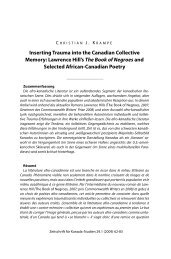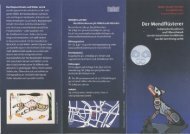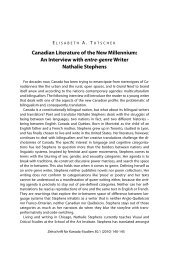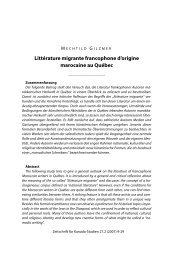The Beginnings of Contemporary Aboriginal Literature in Canada ...
The Beginnings of Contemporary Aboriginal Literature in Canada ...
The Beginnings of Contemporary Aboriginal Literature in Canada ...
You also want an ePaper? Increase the reach of your titles
YUMPU automatically turns print PDFs into web optimized ePapers that Google loves.
82 Hartmut Lutz<br />
No need to tell that he was generous, truthful and honest too.<br />
No boasts <strong>of</strong> arms so strong, <strong>of</strong> will power secure.<br />
Long years <strong>of</strong> tra<strong>in</strong><strong>in</strong>g, <strong>of</strong> bath<strong>in</strong>g <strong>in</strong> the streams <strong>of</strong> a tarn;<br />
Rubb<strong>in</strong>g, knead<strong>in</strong>g and scour<strong>in</strong>g his limbs with the herb <strong>of</strong> yew.<br />
From a child to manhood he was <strong>in</strong> commune with the Creator.<br />
…<br />
He was a man, rooted to the earth. To mother earth.<br />
He was Chah-ma-dah, heir apparent …<br />
(Clutesi 1969, 187-188)<br />
<strong>The</strong> strength <strong>of</strong> the heir apparent comes from his careful tra<strong>in</strong><strong>in</strong>g for the position<br />
he is designed to hold. But it also comes directly from creation around him, from<br />
bath<strong>in</strong>g <strong>in</strong> the streams, and from us<strong>in</strong>g the sacred yew. Most importantly, the land<br />
gives the chief identity and strength to share and hold potlatches: throughout the<br />
book there are passages <strong>of</strong> giv<strong>in</strong>g thanks to the chief’s lands and the overabundance<br />
<strong>of</strong> food they provide to share with all. Clutesi celebrates this identity <strong>in</strong><br />
the seem<strong>in</strong>gly Western conventional form <strong>of</strong> an English poem, but <strong>in</strong> his poem he<br />
still uses methods <strong>of</strong> the Oral Tradition; thus pauses are <strong>in</strong>dicated typographically.<br />
Appear<strong>in</strong>g almost two decades before the first Indian novels <strong>in</strong> <strong>Canada</strong>, and a<br />
year before Markoosie’s Inuit novella Harpoon <strong>of</strong> the Hunter, Clutesi’s <strong>in</strong>novative<br />
book is a textual monument commemorat<strong>in</strong>g the enormous communal spiritual<br />
and material efforts which went <strong>in</strong>to conduct<strong>in</strong>g a potlatch, and it celebrates the<br />
sophistication and the <strong>in</strong>tricate relatedness <strong>of</strong> all participants <strong>in</strong> the event. Similar to<br />
James Sewid’s (auto)biography published <strong>in</strong> the same year, Potlatch is a bold assertion<br />
<strong>of</strong> West Coast culture and a gift to the readers. Thus, the novel is a “Pa-chuk,” a<br />
public gift-giv<strong>in</strong>g <strong>in</strong> itself, and while it is a literary creation, Potlatch is also about<br />
literary creation and creativity – the Short One and others are song makers and<br />
composers. For Clutesi, like modern <strong>Aborig<strong>in</strong>al</strong> writers, there seems to be no contradiction<br />
between traditional identity and modern forms <strong>of</strong> expression on the<br />
written page or the stage. Writ<strong>in</strong>g is merely a technological tool that can be used,<br />
just as metal blades have superseded stone adzes <strong>in</strong> the creation <strong>of</strong> totem poles and<br />
Big Houses. Clutesi’s novel shows that by the end <strong>of</strong> the 1960s <strong>Aborig<strong>in</strong>al</strong> cultures<br />
began assert<strong>in</strong>g themselves as still alive and vibrant, and literature became just one<br />
further medium to express and celebrate their resilience and vitality.<br />
References<br />
Adams, Howard, 1968, <strong>The</strong> Education <strong>of</strong> Canadians 1800-1867: <strong>The</strong> Roots <strong>of</strong> Separatism, Montreal:<br />
Harvest House.<br />
-----, 1975, Prison <strong>of</strong> Grass: <strong>Canada</strong> from the Native Po<strong>in</strong>t <strong>of</strong> View, Toronto: General Publish<strong>in</strong>g.<br />
Akiwenzie-Damm, Kateri (ed. and comp.), 2003, Without Reservation: Indigenous Erotica, Wiarton, ON:<br />
Kegedonce Press / Well<strong>in</strong>gton, Aotearoa, NZ: Huia Publishers.








